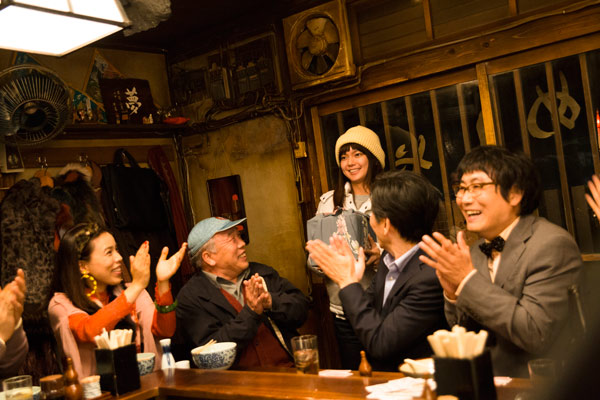After work at Tokyo eatery
By Xu Fan (China Daily) Updated: 2017-07-20 07:22A Japanese film based on manga work finds fans in China. Xu Fan reports.
When Japanese director Joji Matsuoka was asked by someone if he had watched the Chinese TV series Midnight Diner, the audience at the Sunday preview of his latest film in Beijing burst into laughter.
That was because the series is based on a Japanese manga work, and Matsuoka has directed two related films and a TV series.
First emerging as Yaro Abe's popular manga work in 2006, the heart-warming stories about a late-night eatery was adapted into a three-season Japanese TV series from 2009 to 2014, and also spawned two feature-length movies released in 2015 and 2016. All of them are critically acclaimed.
|
 Midnight Diner 2 revolves around the happiness and sorrow of ordinary people, which is one of the biggest draws of the franchise. Photo Provided to China Daily |
Matsuoka was promoting the second feature, Midnight Diner 2, in Beijing ahead of its China premiere. And, the Chinese series helped the Japanese franchise to dominate news in China.
Once among the most anticipated TV dramas, the Chinese series, however, obtained 2.7 points out of 10 on popular reviewing site Douban in June.
Most Chinese viewers complained the series was accompanied by too many advertisements, poor performances by the actors and actresses and the failure to keep the original work's in-depth story.
For diehard fans, the newly released Japanese sequel Midnight Diner 2 is seemingly an authentic effort to remedy their disappointment with the Chinese TV drama.
But for Matsuoka, the question about Chinese series is a bit challenging.
Reluctant to comment more on the Chinese series, he said at Sunday's preview it was "touching" to see that TV producers here considered it for a remake.
Similar to the first movie's structure, Midnight Diner 2 consists of three independent stories - a frustrated editor regaining her confidence, a mother's conflict with her son who wants to marry a woman 15 years older and an elderly woman looking for her missing son.
The film was shot in the franchise' trademark setting, an eatery in Tokyo that runs from midnight to early morning to gather those who take it as a harbor from the busy metropolis.
Having worked with the franchise for eight years, Matsuoka says it has become more difficult to select stories from the original comic material for the movie adaptation.
He says he had to read all the manga books again, with more than 100 stories.
The Japanese franchise focuses on the low-paid people who live on the margins of society. The owner of the eatery, known as The Master, also the only chef at the snack bar, not only fills their stomach but also serves as a therapist listening to their stories of happiness and pain.
"That (tune) is what we have stayed with from the beginning," says Matsuoka, the 56-year-old director.
"We didn't want to shoot rich people, who are probably highlighted in many modern-themed productions. We prefer to explore the tough lives of those who tirelessly work for a better future, and to hail their courage and diligence," he says.
Kobayashi Kaoru, the award-wining Japanese actor who stars as The Master, attended another event in Beijing on July 11.
He says the franchise has been appealing for years, thanks to the story's subtlety as well as its ability to raise modern-day issues.
The key to adapting the popular manga work to successful screen productions was being faithful to the spirit of the comic books, he adds.
"I didn't expect the franchise to be so popular in China," says Kaoru.
As one of the limited imports released in July, the low-budget Midnight Diner 2 earned 4.3 million yuan ($636,500) on Tuesday, taking the fourth spot on China's box-office charts on its debut.
Contact the writer at xufan@chinadaily.com.cn
- 'Cooperation is complementary'
- Worldwide manhunt nets 50th fugitive
- China-Japan meet seeks cooperation
- Agency ensuring natural gas supply
- Global manhunt sees China catch its 50th fugitive
- Call for 'Red Boat Spirit' a noble goal, official says
- China 'open to world' of foreign talent
- Free trade studies agreed on as Li meets with Canadian PM Trudeau
- Emojis on austerity rules from top anti-graft authority go viral
- Xi: All aboard internet express











